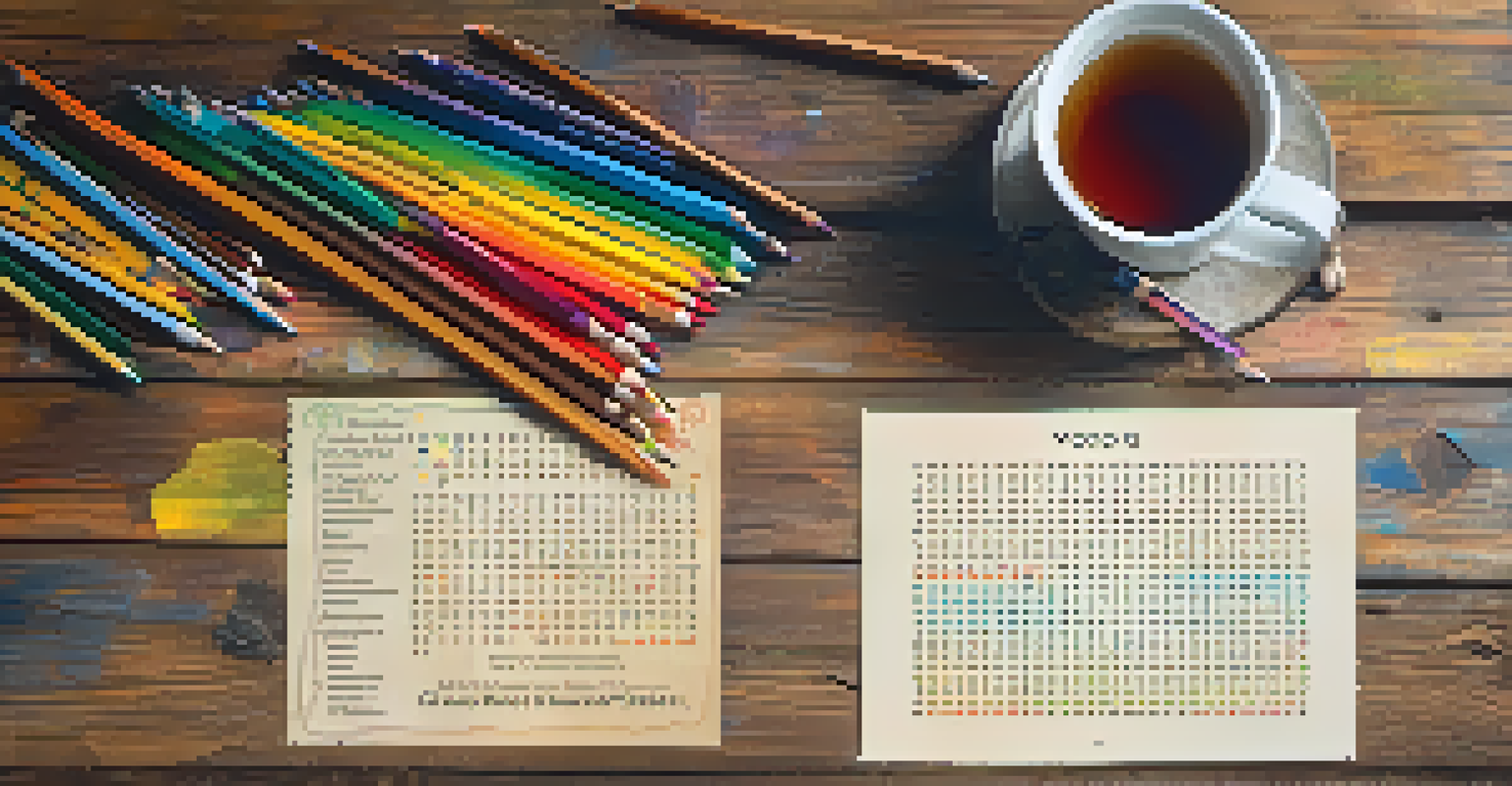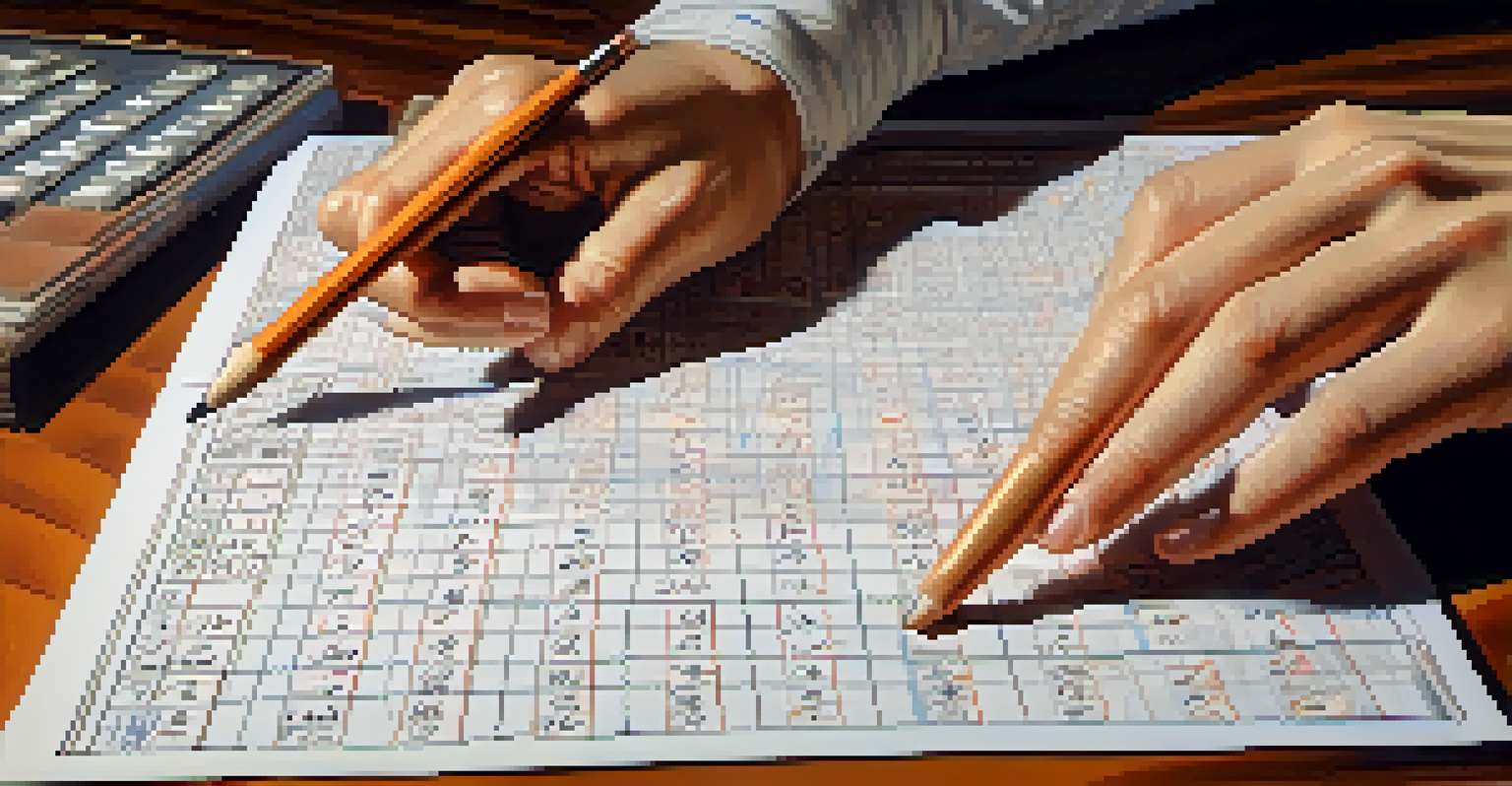Exploring Puzzle Types: From Sudoku to Nonograms

The Allure of Puzzles: Why We Love Them
Puzzles have a unique charm that captivates people of all ages. They challenge our minds, offering a sense of accomplishment when solved. Whether it’s a quick crossword or a complex nonogram, puzzles stimulate our cognitive abilities and improve problem-solving skills.
Puzzles are not just games; they are tools for mental exercise.
Moreover, puzzles can be a great way to unwind and escape from daily stress. They provide a sense of focus and immersion, allowing us to lose track of time while engaging our brains. This combination of challenge and relaxation is what makes puzzles so appealing.
In essence, puzzles are not just games; they are tools for mental exercise. Engaging with various types of puzzles can enhance our creativity and critical thinking. So, let’s dive deeper into the different worlds of puzzles, starting with one of the most popular: Sudoku.
Sudoku: The Classic Number Puzzle
Sudoku is a number placement puzzle that has gained worldwide popularity. The objective is simple: fill a 9x9 grid so that each column, row, and 3x3 subgrid contains all digits from 1 to 9. This straightforward rule belies the complexity that can arise, creating a satisfying challenge.

The beauty of Sudoku lies in its blend of logic and strategy. Players must think several steps ahead, considering potential placements and eliminating possibilities. It's a great way to enhance mathematical thinking and logical reasoning skills.
Puzzles Enhance Mental Skills
Engaging in various puzzles stimulates cognitive abilities, improving problem-solving and critical thinking skills.
From newspapers to mobile apps, Sudoku is accessible to anyone looking to sharpen their minds. Whether you’re a beginner or a seasoned pro, there’s always a new challenge waiting. Plus, with various difficulty levels, everyone can find a puzzle that suits their skill set.
Crossword Puzzles: Wordplay at Its Finest
Crossword puzzles are a delightful mix of vocabulary and trivia, inviting players to fill in a grid with words based on clues. Unlike Sudoku, which is purely numerical, crosswords challenge both your lexicon and general knowledge. They can range from simple fill-ins to complex puzzles that require knowledge of obscure facts.
The essence of a puzzle is that it challenges us to think differently and see the world from a new perspective.
What makes crosswords so engaging is their ability to stimulate our brains in multiple ways. They enhance our language skills, improve memory, and even introduce us to new words and concepts. Each completed puzzle offers a sense of satisfaction, as if you've unlocked a treasure trove of knowledge.
Whether you tackle a daily newspaper crossword or challenge yourself with themed puzzles, there's something rewarding about piecing together words. Plus, working on them with friends or family can turn a solitary activity into a fun group challenge.
Nonograms: The Picture Puzzles
Nonograms, also known as Picross or Griddlers, take a unique approach to puzzles by combining logic with art. The goal is to fill in squares on a grid based on numerical clues provided for each row and column, ultimately revealing a hidden picture. It’s like painting by numbers, but with a logical twist.
What’s captivating about nonograms is their ability to engage both the left and right sides of the brain. Players need to think critically to decipher the clues while also envisioning the final image. This dual challenge makes them both stimulating and rewarding.
Different Puzzles for Everyone
With options like Sudoku, crosswords, and nonograms, there's a puzzle type to suit every preference and skill level.
As you solve a nonogram, you experience the thrill of discovery when the picture begins to emerge. It’s a creative process that not only sharpens your logic skills but also provides a sense of accomplishment as you unveil the completed artwork.
Kakuro: The Cross between Crossword and Sudoku
Kakuro, often called the ‘cross-sum’ puzzle, is a fascinating blend of crossword and Sudoku concepts. In Kakuro, numbers replace letters, and players must fill in a grid to achieve the sums indicated by the clues provided. It’s a unique twist that adds a mathematical flavor to the traditional crossword format.
This puzzle requires a mix of logic, math, and deductive reasoning. Players must consider multiple sums simultaneously, making it a bit more complex than Sudoku. It encourages strategic thinking and the ability to adapt as new numbers are placed.
Kakuro appeals to those who enjoy numerical challenges and want to expand their puzzle-solving repertoire. As you work through the clues, the satisfaction of arriving at the correct solution is immensely rewarding, making it a favorite among puzzle enthusiasts.
Word Searches: Fun with Hidden Words
Word searches are a beloved pastime that invites players to hunt for words hidden within a grid of letters. The objective is simple: find and circle all the listed words within a set time or at your own pace. This straightforward format makes word searches accessible to all ages.
The thrill of a word search lies in the hunt itself. As you scan the grid, there’s a sense of excitement with each word you uncover. They’re perfect for a quick mental break and can be enjoyed alone or with friends, making them a social activity as well.
Puzzles Offer Relaxation and Fun
Solving puzzles provides a rewarding escape from daily stress, allowing individuals to immerse themselves in a satisfying challenge.
Beyond entertainment, word searches can also enhance visual scanning and pattern recognition skills. They’re often used in educational settings to help children develop their reading and vocabulary skills in a fun way. So, next time you pick up a word search, remember: it’s not just a game; it’s a brain workout!
Logic Puzzles: The Ultimate Brain Teasers
Logic puzzles are the crème de la crème of mental challenges, designed to test your deductive reasoning and critical thinking skills. These puzzles often present a scenario with a series of clues, and your task is to piece together the information to arrive at a solution. They can range from simple riddles to complex scenarios requiring intricate reasoning.
What makes logic puzzles particularly engaging is the satisfaction that comes from unraveling a challenging problem. Solving them often feels like cracking a code or uncovering a mystery, which can be immensely rewarding. They encourage lateral thinking and help develop problem-solving strategies.

Whether you’re working on a classic logic grid puzzle or a riddle that challenges your assumptions, these puzzles push you to think outside the box. They are perfect for those who enjoy a good mental workout and love the thrill of solving intricate problems.
Choosing the Right Puzzle for You
With so many puzzle types available, it can be overwhelming to decide where to start. Consider what you enjoy: do you prefer numbers, words, or visual challenges? Each puzzle type offers a different experience, so it’s worth exploring a few to find your favorite.
You might start with Sudoku for a logical challenge, then switch to crosswords for some wordplay. Nonograms can offer a satisfying blend of both, while Kakuro adds a numerical twist to the crossword format. Each type engages different cognitive skills, making your puzzle journey rich and varied.
Ultimately, the best puzzle is one that brings you joy and satisfaction. Whether you’re looking for a quick mental break or a deep dive into a challenging problem, the world of puzzles is vast and inviting. Embrace the adventure, and you might just discover a new favorite pastime!